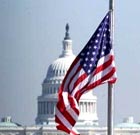| Senate Democrats called for a perjury investigation against Attorney General Alberto Gonzales on Thursday and subpoenaed top presidential aide Karl Rove in a deepening political and legal clash with the Bush administration. "It has become apparent that the attorney general has provided at a minimum half-truths and misleading statements," four Democrats on the Senate Judiciary Committee wrote in a letter to Solicitor General Paul Clement. They dispatched the letter shortly before Sen. Patrick Leahy, D-Vt., announced the subpoena of Rove, the president's top political strategist, in remarks on the Senate floor. The White House has claimed executive privilege to block Congress from receiving documents or testimony by current and former presidential aides. ``We have now reached a point where the accumulated evidence shows that political considerations factored into the unprecedented firing of at least nine United States attorneys last year,'' said Leahy, chairman of the Senate Judiciary Committee. In response, White House spokesman Tony Fratto said, "Every day congressional Democrats prove that they're more interested in headlines than doing the business Americans want them to do. And Americans are now taking notice that this Congress, under Democratic leadership, is failing to tackle important issues," he said. Gonzales is at the center of the U.S. attorney controversy, but the call for a perjury probe involved alleged conflicts between testimony he gave the Judiciary Committee in two appearances, one last year and the other this week. The issue revolves around whether there was internal administration dissent over the president's warrantless wiretapping program. As for the firing of the prosecutors, e-mails released by the Justice Department show Gonzales' aides conferred with Rove on the matter. Leahy also said he was issuing a subpoena for J. Scott Jennings, a White House political aide. The deadline for him and Rove to comply was set as Aug. 2. "For over four months, I have exhausted every avenue seeking the voluntary cooperation of Karl Rove and J. Scott Jennings, but to no avail," the Vermont lawmaker said. "They and the White House have stonewalled every request. Indeed, the White House is choosing to withhold documents and is instructing witnesses who are former officials to refuse to answer questions and provide relevant information and documents." The call for a perjury investigation marked yet another complication for Gonzales, whose fitness to serve has been bluntly criticized by Republicans and Democrats alike. Sen. Arlen Specter, R-Pa., the senior Republican on the Senate Judiciary Committee, told reporters aboard Air Force One during the day that he "might" raise the issue with the president, who has steadfastly stood by his longtime friend. And Senate Majority Leader Harry Reid, D-Nev., told reporters, "I'm convinced that he's not telling the truth," based on conversations with Democrats on the Judiciary Committee. In a separate letter Thursday to Gonzales, Leahy said he would give the attorney general eight days to correct, clarify or otherwise change his testimony "so that, consistent with your oath, they are the whole truth." In their letter to Clement, the four senators wrote that Gonzales' testimony last year that there had been no internal dissent over the president's warrantless wiretapping program conflicted with testimony by former Deputy Attorney General James Comey and with Gonzales' own statements this week before the Judiciary Committee. They also said Gonzales falsely told the panel that he had not talked about the firings with other Justice Department officials. His former White House liaison, Monica Goodling, told the House Judiciary Committee under a grant of immunity that she had an "uncomfortable" conversation with Gonzales in which he outlined his recollection of what happened and asked her for her reaction. "The attorney general should be held to the highest ethical standards," the senators wrote. Sen. Charles Schumer, D-N.Y., one of the four lawmakers to sign the letter, was sharply critical of Gonzales. "There's no wiggle room." Schumer said.
It's not misleading. Those are deceiving. Those are lying." Clement would decide whether to appoint a special prosecutor because Gonzales and outgoing Deputy Attorney General Paul McNulty have recused themselves from the investigation that involves them. The Justice Department's No. 3 official, Associate Attorney General William Mercer, is serving only in an acting capacity and therefore does not have the authority to do so. At issue is what was discussed at a March 10, 2004, congressional briefing. A letter from then-Director of National Intelligence John Negroponte said the briefing concerned the administration's terrorist surveillance program on the eve of its expiration. But Gonzales, at Tuesday's Senate Judiciary Committee hearing, repeatedly testified that the issue at hand was not about the terrorist surveillance program, which allowed the National Security Agency to eavesdrop on suspects in the United States without receiving prior court approval. Instead, Gonzales said, the emergency meetings on March 10, 2004, focused on an intelligence program that he would not describe. He said the meeting prompted him to go to the bedside of ailing then-Attorney General John Ashcroft to recertify the surveillance program, but he denied pressuring Ashcroft to do so. Ashcroft, recovering from gall bladder surgery, refused. White House press secretary Tony Snow defended Gonzales on Thursday but would not talk about the subject of the 2004 briefing. "Unfortunately we get into areas that you cannot discuss openly," Snow said. "It's a very complex issue. But the attorney general was speaking consistently. The president supports him. I think at some point this is going to be something where members are going to have to go behind closed doors and have a fuller discussion of the issues. But I can't go any further than that." |





